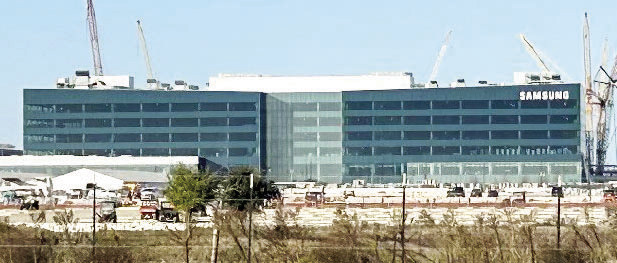SOUTH KOREA TURMOIL
Officials unfazed after martial law declared in plant's home country
TAYLOR — Despite political chaos that erupted in South Korea on Tuesday, Dec. 3 — sparked by a martial-law declaration by that nation’s president — local and Williamson County officials suggested the turmoil will have no impact on the Samsung Austin Semiconductor plant or any area suppliers headquartered in the Asian country.
Accusing his nation’s main opposition party of sympathizing with North Korea and anti-state activities, South Korea President Yoon Suk Yeol declared
“
This is a developing international incident that does not currently have any foreseeable impact on the city of Taylor.”
— Daniel Seguin, Taylor spokesman martial law as reported by multiple media outlets.

The declaration allows for the temporary substitution of military authority for civilian rule — a step normally taken in wartime or natural disaster.
Why would such machinations some 7,000 miles from Williamson County be of particular concern locally? Because of fears trans-Pacific turmoil might jeopardize economic ties in the area — especially at the massive, South Koreanowned $17 billion Samsung semiconductor plant gearing to be fully operational by 2026.
An older Samsung plant is located just miles away in Austin.
In October, county officials also ushered in Samsung supplier Soulbrain, formalizing a tax-abatement agreement in luring the company to build a $575 million chemical plant in the county.
All told, seven South Korean businesses have come to the region since Samsung’s announcement in November 2021 a semiconductor fabrication facility was coming to Taylor.
Local officials, however, seemed unfazed by the far-away developments.
“We’re not having any comment,” Ben White, president and CEO of the Taylor Economic Development Corp., told the Press Tuesday. “It’s moving very quickly, so we have no comment.”
Williamson County spokeswoman Connie Odom took the same tack.
“Williamson County does not have a comment at this time,” she wrote via email.
A statement from Williamson County Judge Bill Gravell — who’s led county delegations into South Korea to drum up additional business — also was not forthcoming.
In a previous meeting of county commissioners, Gravell revealed a delegation of South Korean officials are scheduled to visit Williamson County in January — although the status of those plans in light of the South Korean political pulse is now unknown.
Conversely, a well-placed source at Samsung told the Press the overseas machinations would have no impact locally.
Taylor city spokesman Daniel Seguin echoed the sentiment.
“We are not aware of any changes to the operations of local businesses due to the events still unfolding overseas,” he wrote in response to questions. “The events in Asia have not altered the county’s business ties.”
He added, “At this time, we do not plan to make any changes to future plans and schedules due to those events. This is a developing international incident that does not currently have any foreseeable impact on the city of Taylor.”
As night descended on South Korea, tensions gradually eased. After South Korea lawmakers voted to block their president’s decree of martial law — 190 of them in a 300-seat national assembly — the measure was lifted.
Back in Williamson County, all was quiet. But officials may next cast a wary eye on China, which retaliated against U.S. trade restrictions by banning exports of high-tech materials needed for advanced manufacturing on the same day of the South Korea strife. According to Newsweek, China has explicitly decided to target crucial materials for the production of semiconductors, mobile devices and more.
For now, the impact on Williamson County on that front is too early to tell.



